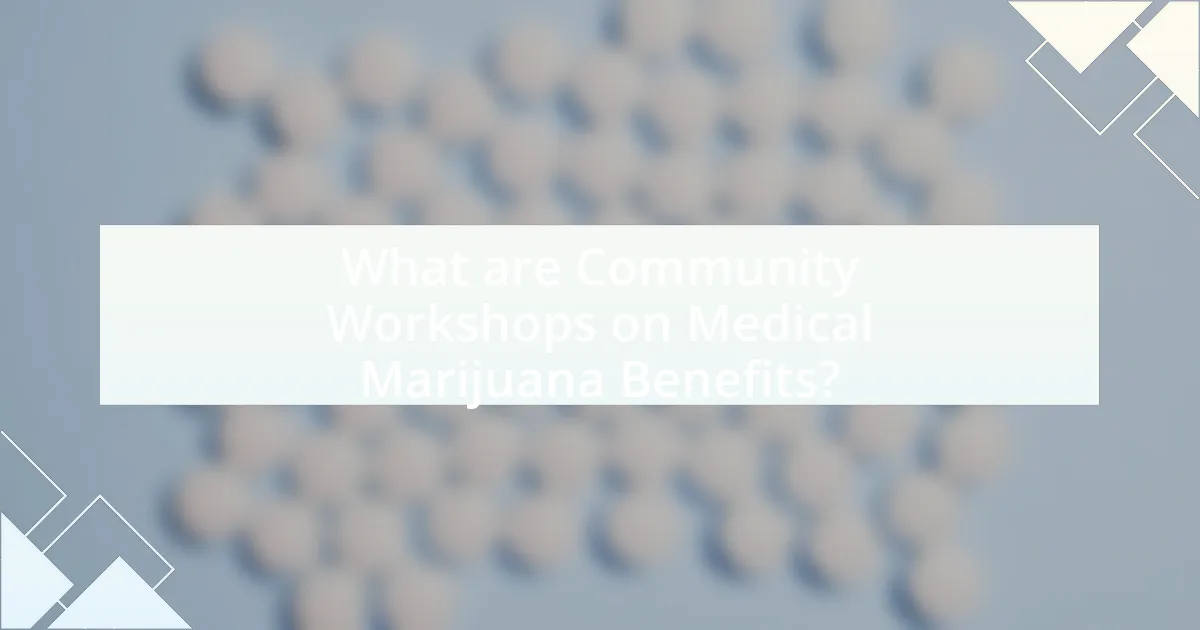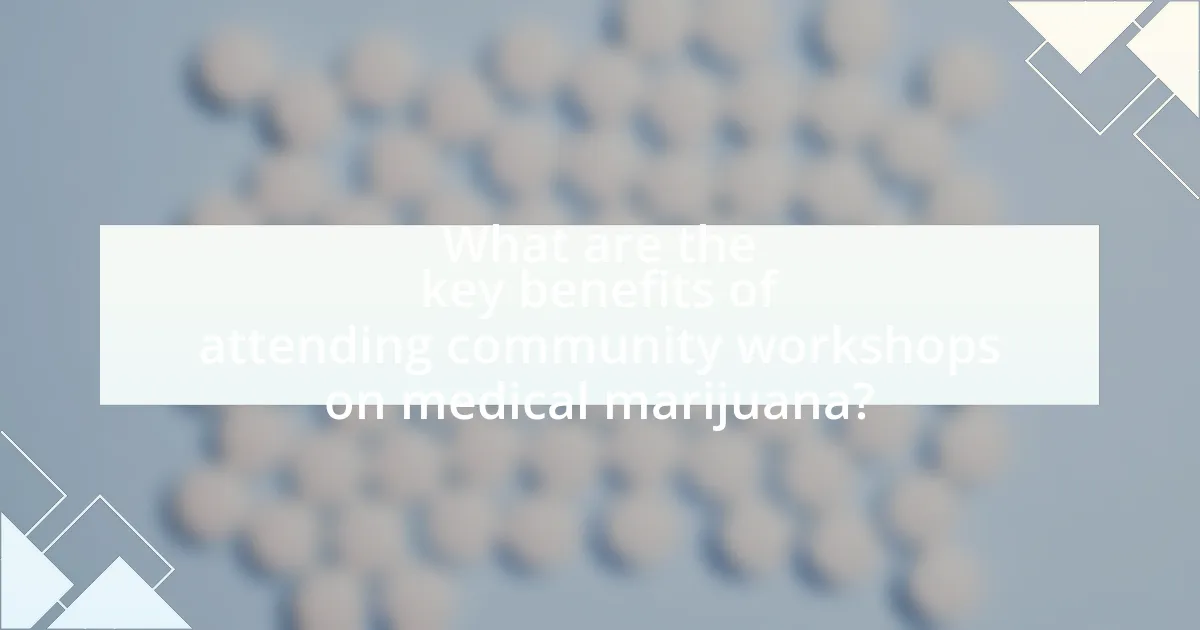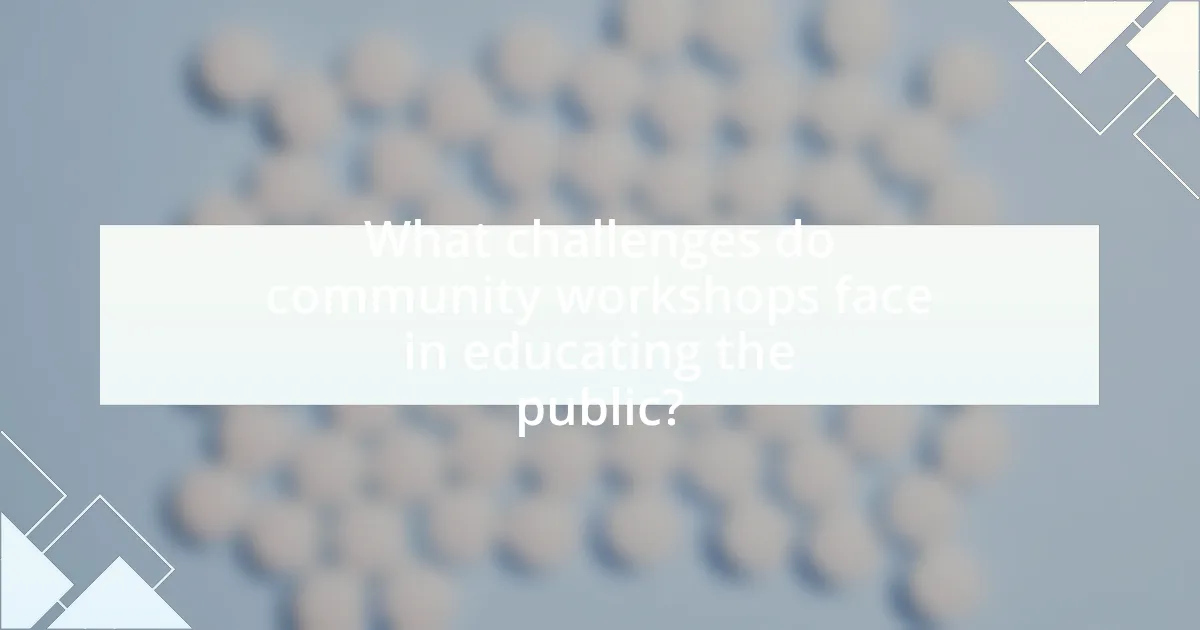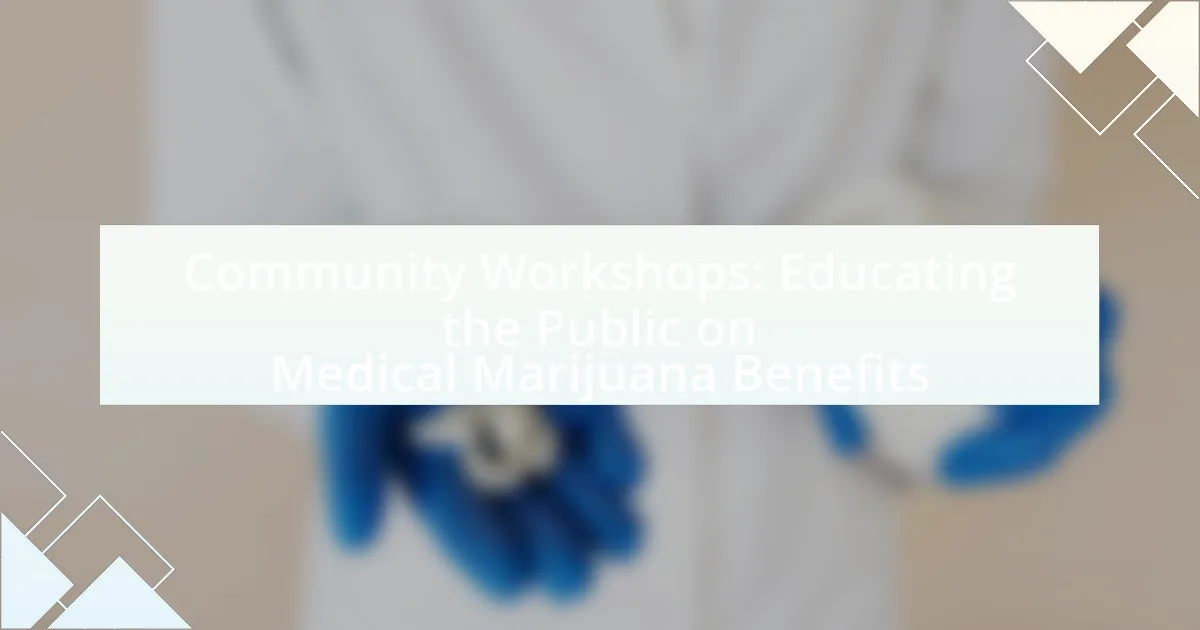Community Workshops on Medical Marijuana Benefits are educational events aimed at informing the public about the therapeutic uses and advantages of medical marijuana. These workshops feature expert speakers, including healthcare professionals and researchers, who provide evidence-based information on various health conditions that medical marijuana can alleviate, such as chronic pain, anxiety, and epilepsy. The article outlines how these workshops enhance public understanding, address misconceptions, and promote health literacy, while also discussing the challenges facilitators face in organizing them. Key topics covered include the benefits of attending, the role of facilitators, and the importance of interactive elements in improving participant engagement.

What are Community Workshops on Medical Marijuana Benefits?
Community Workshops on Medical Marijuana Benefits are educational events designed to inform the public about the therapeutic uses and advantages of medical marijuana. These workshops typically feature expert speakers, including healthcare professionals and researchers, who present evidence-based information on how medical marijuana can alleviate various health conditions, such as chronic pain, anxiety, and epilepsy. Research indicates that such workshops can enhance public understanding and acceptance of medical marijuana, as evidenced by a study published in the Journal of Psychoactive Drugs, which found that educational interventions significantly improved knowledge and attitudes toward medical cannabis among participants.
How do these workshops educate the public?
These workshops educate the public by providing comprehensive information on the benefits and uses of medical marijuana. Participants learn about the therapeutic effects, legal regulations, and potential side effects associated with medical marijuana use. Research indicates that educational workshops can significantly increase knowledge and awareness; for instance, a study published in the Journal of Cannabis Research found that participants reported a 70% increase in understanding after attending such workshops. This structured approach fosters informed decision-making and promotes responsible use of medical marijuana within the community.
What topics are typically covered in these workshops?
Community workshops focused on educating the public about medical marijuana benefits typically cover topics such as the medical uses of cannabis, legal regulations surrounding its use, dosage and administration methods, potential side effects, and patient testimonials. These workshops aim to provide comprehensive information to help attendees understand how medical marijuana can be utilized for various health conditions, including chronic pain, anxiety, and epilepsy. Additionally, discussions often include the latest research findings and advancements in cannabis studies, ensuring that participants receive up-to-date and evidence-based information.
Who are the facilitators of these workshops?
The facilitators of these workshops are typically healthcare professionals, including doctors, nurses, and licensed medical marijuana experts. These individuals possess the necessary knowledge and experience to educate participants about the benefits and uses of medical marijuana. Their expertise ensures that the information provided is accurate and reliable, which is crucial for fostering understanding and awareness in the community regarding medical marijuana.
Why are community workshops important for public awareness?
Community workshops are important for public awareness because they facilitate direct engagement and education on critical topics, such as the benefits of medical marijuana. These workshops provide a platform for experts to share evidence-based information, dispel myths, and address community concerns, thereby enhancing understanding and acceptance. Research indicates that community-based education significantly increases knowledge retention and encourages informed decision-making among participants, which is essential for topics that may be stigmatized or misunderstood, like medical marijuana.
How do they address misconceptions about medical marijuana?
They address misconceptions about medical marijuana through community workshops that provide accurate information and evidence-based education. These workshops often feature healthcare professionals who explain the science behind medical marijuana, its benefits, and its risks, thereby dispelling myths. For instance, studies have shown that medical marijuana can effectively manage chronic pain and reduce symptoms of certain medical conditions, which counters the misconception that it is solely a recreational drug. By presenting factual data and personal testimonials, these workshops aim to create a well-informed public that understands the legitimate medical uses of marijuana.
What role do community workshops play in promoting health literacy?
Community workshops play a crucial role in promoting health literacy by providing accessible education on health topics, including medical marijuana benefits. These workshops facilitate direct interaction between health professionals and community members, allowing for the dissemination of accurate information and clarification of misconceptions. Research indicates that community-based educational interventions can significantly improve knowledge and attitudes towards health issues, as evidenced by a study published in the Journal of Health Communication, which found that participants in community workshops demonstrated a 40% increase in health literacy scores compared to those who did not attend. This highlights the effectiveness of workshops in enhancing understanding and empowering individuals to make informed health decisions.

What are the key benefits of attending community workshops on medical marijuana?
Attending community workshops on medical marijuana offers several key benefits, including increased knowledge about its therapeutic uses, improved understanding of legal regulations, and enhanced community support networks. These workshops provide participants with evidence-based information on how medical marijuana can alleviate various health conditions, such as chronic pain and anxiety, thereby empowering individuals to make informed decisions regarding their health. Additionally, they educate attendees about the legal landscape surrounding medical marijuana, ensuring that individuals are aware of their rights and responsibilities. Furthermore, these workshops foster connections among community members, creating support systems that can help individuals navigate their medical marijuana journeys more effectively.
How can participants gain knowledge about medical marijuana?
Participants can gain knowledge about medical marijuana through community workshops that focus on its benefits and uses. These workshops typically feature expert speakers, including healthcare professionals and researchers, who provide evidence-based information on the therapeutic effects of medical marijuana. For instance, studies have shown that medical marijuana can alleviate chronic pain and reduce symptoms in conditions like epilepsy and multiple sclerosis. Additionally, participants can access educational materials and resources during these workshops, which further enhance their understanding of medical marijuana’s applications and legal considerations.
What specific medical conditions can benefit from medical marijuana?
Medical marijuana can benefit specific medical conditions such as chronic pain, epilepsy, multiple sclerosis, cancer-related symptoms, and post-traumatic stress disorder (PTSD). Research indicates that cannabinoids in medical marijuana can alleviate chronic pain by interacting with the body’s endocannabinoid system, which regulates pain perception. A study published in the Journal of Pain found that cannabis use significantly reduced chronic pain in patients. Additionally, the American Epilepsy Society has noted that cannabidiol, a compound in medical marijuana, can reduce seizure frequency in epilepsy patients. For multiple sclerosis, clinical trials have shown that medical marijuana can help reduce muscle spasms and improve mobility. In cancer patients, medical marijuana is often used to manage nausea and vomiting associated with chemotherapy, as supported by findings from the National Cancer Institute. Lastly, studies have demonstrated that medical marijuana can help alleviate symptoms of PTSD, including anxiety and insomnia, as reported by the Journal of Psychoactive Drugs.
How does understanding medical marijuana improve patient outcomes?
Understanding medical marijuana improves patient outcomes by enabling informed decision-making regarding treatment options. When patients are educated about the therapeutic benefits, potential side effects, and appropriate dosages of medical marijuana, they can better manage their symptoms and conditions. Research indicates that patients who receive education on medical marijuana report higher satisfaction with their treatment and improved quality of life. For instance, a study published in the Journal of Pain Research found that patients using medical cannabis for chronic pain experienced significant reductions in pain levels and improved functionality. This evidence underscores the importance of education in maximizing the benefits of medical marijuana for patients.
What resources are available for workshop attendees?
Workshop attendees have access to a variety of resources, including informational brochures, expert-led discussions, and hands-on activities related to medical marijuana benefits. These resources are designed to enhance understanding and provide practical knowledge. For instance, attendees often receive printed materials that summarize key points discussed during the workshop, which can serve as reference guides. Additionally, workshops may feature Q&A sessions with healthcare professionals, allowing participants to engage directly with experts and clarify any doubts. This structured approach ensures that attendees leave with a comprehensive understanding of the subject matter.
How can attendees access further information after the workshop?
Attendees can access further information after the workshop by visiting the official website dedicated to the community workshops on medical marijuana benefits. This website typically includes resources such as presentation slides, additional reading materials, and contact information for follow-up questions. Furthermore, attendees may receive a follow-up email containing links to relevant articles and resources discussed during the workshop, ensuring they have access to comprehensive information for their continued education on the topic.
What support networks exist for individuals interested in medical marijuana?
Support networks for individuals interested in medical marijuana include advocacy organizations, online forums, and local support groups. Advocacy organizations, such as the National Organization for the Reform of Marijuana Laws (NORML) and the Marijuana Policy Project (MPP), provide resources, education, and legislative support. Online forums, like Reddit’s r/medicalmarijuana, offer peer support and shared experiences. Local support groups often meet in community centers or health facilities, providing a space for individuals to discuss their experiences and access information about medical marijuana. These networks facilitate education and community engagement, helping individuals navigate the complexities of medical marijuana use.

What challenges do community workshops face in educating the public?
Community workshops face several challenges in educating the public about medical marijuana benefits, primarily including misinformation, varying levels of public interest, and logistical constraints. Misinformation about medical marijuana can lead to skepticism and resistance among community members, making it difficult for workshops to convey accurate information. Additionally, public interest can vary significantly; some individuals may be highly engaged, while others may be indifferent or resistant to the topic, complicating outreach efforts. Logistical constraints, such as limited funding, inadequate venues, and scheduling conflicts, can hinder the ability to organize effective workshops. These challenges collectively impact the effectiveness of community workshops in disseminating knowledge about medical marijuana.
How do legal regulations impact the content of these workshops?
Legal regulations significantly shape the content of community workshops focused on educating the public about medical marijuana benefits. These regulations dictate what information can be shared, ensuring compliance with state and federal laws regarding medical marijuana use, distribution, and education. For instance, in states where medical marijuana is legal, workshops must adhere to guidelines set by health departments, which may include specific educational materials that accurately reflect legal usage and health benefits. Additionally, regulations may restrict the promotion of marijuana products, requiring workshops to focus on educational rather than commercial content. This ensures that participants receive accurate, lawful information, thereby fostering a responsible understanding of medical marijuana within the community.
What barriers do facilitators encounter when organizing workshops?
Facilitators encounter several barriers when organizing workshops, including limited funding, scheduling conflicts, and participant engagement challenges. Limited funding restricts the resources available for venue rental, materials, and promotional efforts, which can hinder the overall quality and reach of the workshop. Scheduling conflicts arise when potential participants have prior commitments, making it difficult to find a suitable time that accommodates the majority. Additionally, engaging participants can be challenging due to varying levels of interest and knowledge about medical marijuana, which may affect attendance and active participation. These barriers can significantly impact the effectiveness and success of workshops aimed at educating the public on medical marijuana benefits.
How can misinformation be effectively countered in these settings?
Misinformation can be effectively countered in community workshops focused on educating the public about medical marijuana benefits by providing accurate, evidence-based information and fostering open dialogue. These workshops should include expert speakers who can present scientific research, such as studies published in journals like the Journal of Pain Research, which demonstrate the therapeutic effects of medical marijuana. Additionally, interactive sessions that allow participants to ask questions and express concerns can help clarify misconceptions. Research indicates that community engagement and education significantly reduce misinformation, as seen in initiatives by organizations like the National Institute on Drug Abuse, which emphasize the importance of factual communication in public health education.
What strategies can enhance the effectiveness of community workshops?
To enhance the effectiveness of community workshops focused on educating the public about medical marijuana benefits, facilitators should implement interactive activities, utilize expert speakers, and ensure clear communication of information. Interactive activities, such as group discussions and hands-on demonstrations, engage participants and foster a collaborative learning environment. Inviting expert speakers, such as medical professionals or researchers, provides credible insights and encourages trust in the information presented. Clear communication, including the use of visual aids and straightforward language, ensures that complex topics are easily understood by diverse audiences. These strategies have been shown to increase participant engagement and retention of information, ultimately leading to more informed community members.
How can interactive elements improve participant engagement?
Interactive elements enhance participant engagement by fostering active participation and creating a dynamic learning environment. When participants engage with interactive components, such as polls, quizzes, or hands-on activities, they are more likely to retain information and feel invested in the learning process. Research indicates that interactive learning can increase retention rates by up to 75%, compared to traditional lecture-based methods, which typically yield retention rates around 5-10%. This increased engagement not only enhances understanding of complex topics, such as the benefits of medical marijuana, but also encourages participants to share their thoughts and experiences, leading to richer discussions and a more collaborative atmosphere.
What best practices should facilitators follow to ensure clarity?
Facilitators should use clear and concise language to ensure clarity during community workshops on medical marijuana benefits. This involves avoiding jargon and technical terms that may confuse participants, instead opting for straightforward explanations that are easily understood. Additionally, facilitators should actively engage participants by encouraging questions and providing examples relevant to their experiences, which enhances understanding. Visual aids, such as slides or handouts, can also reinforce key points and improve retention of information. Research indicates that effective communication strategies, including the use of relatable analogies and interactive discussions, significantly enhance participant comprehension and retention in educational settings.
What are some practical tips for individuals attending these workshops?
Individuals attending community workshops on medical marijuana benefits should prepare by researching the topic beforehand. Familiarizing oneself with the basics of medical marijuana, including its uses, benefits, and legal status, enhances understanding and engagement during discussions. Additionally, bringing a notebook or digital device for taking notes can help capture important information and insights shared by speakers. Engaging actively by asking questions and participating in discussions fosters a deeper learning experience. Networking with other attendees can also provide valuable perspectives and resources. These strategies are supported by the fact that active participation and preparation significantly improve knowledge retention and understanding in educational settings.

Leave a Reply